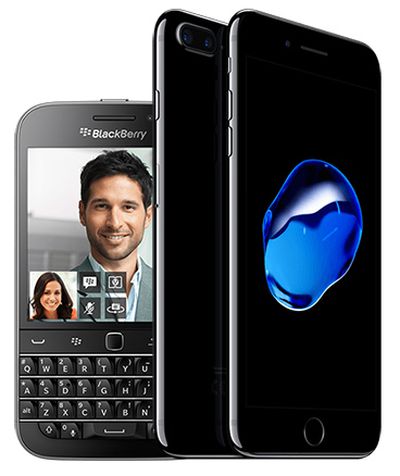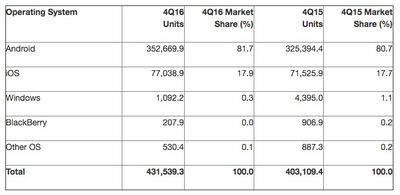Nearly ten years after Apple launched the iPhone, which completely upended the smartphone industry, the device has effectively helped to wipe out one of its major predecessors: the BlackBerry.

BlackBerry has at last fallen to a rounded 0.0% share among smartphone operating systems after shipping just 207,000 smartphones last quarter, following an over seven year decline from its peak market share of approximately 20% in 2009, according to the latest quarterly data from research firm Gartner.
The demise of the smartphone that was once the poster child of Canadian innovation has been a long one in the making, but one that was inevitable now that BlackBerry has shifted its focus to software and sold the global rights to future BlackBerry-branded smartphones to Chinese company TCL Communication.
BlackBerry actually continued to grow for around two years after the iPhone launched in June 2007, taking market share away from then-leader Nokia. BlackBerry's market share among all smartphone operating systems was 9.6% in 2007, 16.6% in 2008, and 19.9% in 2009, according to Gartner. Then, the decline started.
By 2011, the surging popularity of iPhones and Samsung Galaxy smartphones led iOS and Android to leapfrog BlackBerry and Nokia to form a duopoly in the smartphone market that exists to this day. iOS and Android combined for a record 99.6% market share last quarter, according to Gartner.

Windows 10 Mobile was the only other platform to make any sort of dent last quarter, recording an insignificant 0.3% market share, according to Gartner. Windows 10 Mobile fell from 1.1% in the year-ago quarter. A group of unnamed "other" operating systems captured the remaining 0.1% share.
iOS adoption is still low compared to Android, with the platforms capturing 17.9% and 81.7% worldwide market share respectively in the fourth quarter. iPhones mainly target the premium smartphone market, however, while there are Android-based smartphones at all price points sold by dozens of brands.
What's next for BlackBerry? In addition to focusing on software, the company is also doing self-driving vehicle research, while its rumored "Mercury" smartphone by TCL will be unveiled on February 25 at Mobile World Congress.




















